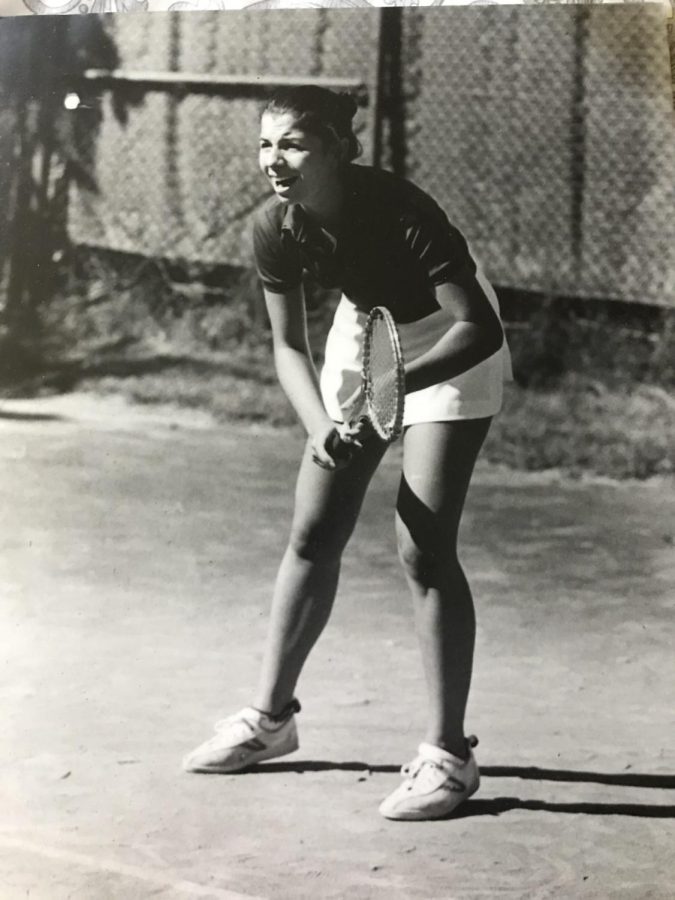Jean Lenti Ponsetto and others reflect on the Impact of Title IX: ‘I Stood on Broad Shoulders’
Courtesy of Jean Ponsetto for The DePaulia
Jean Ponsetto awaits a serve while playing for DePaul’s tennis team in 1978.
Many student athletes have seen the murals painted on the pillars behind the athletic center, right next to Wish Field and Cacciatore Stadium. These pillars are dedicated to many different figures of the university’s history. Soon, there will be some new recognizable figures joining the many greats of the university’s history.
On September 2nd DePaul Athletics announced that they are adding a final installment to the Pillars of DePaul Mural Collection. These collections of murals were created by Brother Mark Elder and his students. The new additions will celebrate the 50th anniversary of the passage of Title IX, probiting discrimination based on sex in schools.
Doug Bruno, who has been the head coach for the women’s basketball program for 36 years, talked about the impact the law has made on society.
“It’s a civil rights law,” Bruno said. “This is a law not about sports, it was written into law that institutions provided equal opportunity for all genders.”
The Title IX Pillar will feature images of Doug Bruno and former Athletic Director Jean Lenti Ponsetto in recognition of their impact on women in athletics at DePaul University. The mural will also feature more than 50 other teams and individuals who made an impact on DePaul and their respected athletic programs. The ceremony will take place on Oct. 15 as part of the Alumni and Family Weekend.
Bruno believes this pillar is a representation of all the women who laid down the groundwork of Title IX for the university.
“I really think about in terms of all the women that took directly steps to provide for women here,” Bruno said. “Jean Lenti Ponsetto is one of them, Patricia Ewers, and Gene Sullivan, these are the people at DePaul that stood up and made an impact back when the law was first being enacted in the 1970s.”

Ponsetto had spent 42 years working in the athletic department at DePaul University. Before starting her career in athletic administration, she was a multiple sport athlete during her time at DePaul. She competed in basketball, volleyball, tennis and softball and started as an assistant coach for the women’s basketball team. She also was the head coach for the softball team.
After moving into athletic administration and climbing through the ranks of the athletic department, she was named the athletic director of the university in 2002 and remained as the athletic director until retirement in August of 2020.
Reflecting on her days as a student athlete, Ponsetto considered it a “magical era” when she was planning to go to college. Title IX had been passed in 1972 and she chose to enroll at DePaul in 1974.
“I went to an all-girls high school, Stetson Academy in the south suburbs,” Ponsetto said. “DePaul had a women’s basketball, volleyball and tennis teams. These were all sports that I played.”
She also joined the softball team in the spring of 1977.
Ponsetto felt it was an honor to represent the university during her time as a student athlete. She also got to participate with many different athletes who would go onto be some of the first generations of their respected sports they played at the collegiate level.
“I was able to represent DePaul University in four different sports,” Ponsetto said. “I also was able to compete alongside some great women who would become pioneers to their respected sports.”
She gives credit to the Vincentian fathers of the school who gave them the many opportunities to compete. They invested deeply into the equal opportunity for female athletes and valued deeply in allowing these opportunities for women to develop their leadership skills and service skills to the bigger community.
Athletes can still feel the impact of Title IX today. Former DePaul softball outfielder Kate Polucha noticed that the law has been talked about more today in her sport of softball.
“Title IX is gaining more attention today that it has over the years,” Polucha said. “It’s been talked about more across multiple media outlets than ever before.”
She also mentioned how the sport of softball is gaining more viewers than it ever has in the past.
“Just this past year, the Women’s College World Series gained more viewership,” Polucha said. “They had more viewers tuning into the games than the Men’s College World Series.”
College athletics have changed a lot since Title IX was put into law. Women’s athletics were not a part of the NCAA. They played under the Association of Intercollegiate Athletics for Women.
Competing teams would be placed into divisions based on the number of students enrolled in respected universities. Teams would compete in a state championship, and the winner of the state championship would play in the regional against the winner of the surrounding states. Many of the teams did not have their own facilities to practice at when they first started playing, unlike today, where many teams all have a location for practice and competition.
The gear provided for female athletes changed as well. Ponsetto said her and her teammates would buy their own shoes for competition and would drive each other with their own cars. The school would provide jerseys for competition but some programs shared the same uniforms like the volleyball and women’s basketball program.
“We wore the same jersey for both volleyball and basketball,” Ponsetto said. “It was basically an upgraded t-shirt.”
Much has changed since those days, and Polucha is grateful that those and many others before her set down the foundation for her to compete in her respected sport.
“Title IX impacted me greatly as a student athlete,” Polucha said. “It gave me a great opportunity to succeed greatly in my sport but also in the classroom as well.”
As she gets ready for the unveiling of the mural next month, Ponsetto is humbled about the opportunity and feels the recognition should go to the many others that were before her who laid down the foundation of the impact of Title IX at DePaul.
“I am incredibly humbled by the whole experience,” Ponsetto said. “This pillar will represent all the student athletes from 1974-2020. It’s a recognition for them and the many others in the athletic department.”







